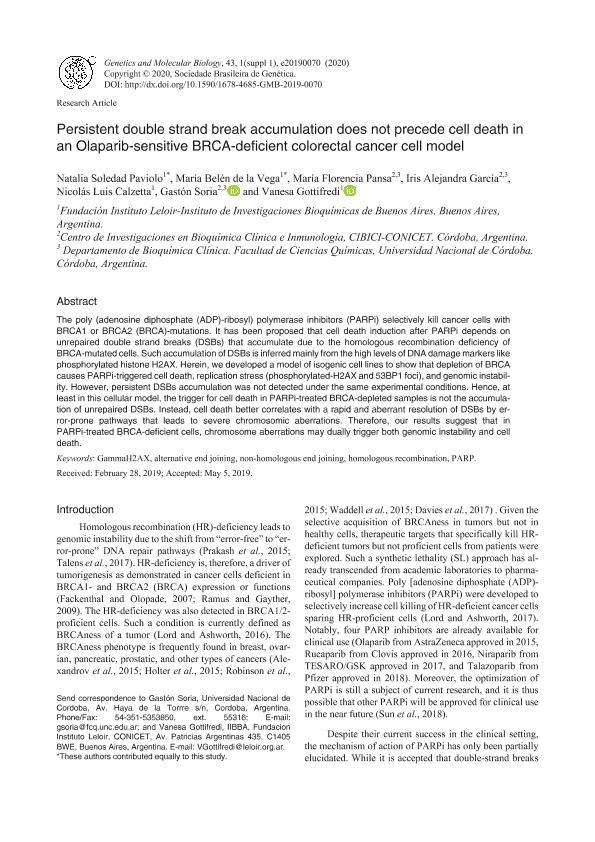Mostrar el registro sencillo del ítem
dc.contributor.author
Paviolo, Natalia Soledad

dc.contributor.author
de la Vega Páez, María Belén

dc.contributor.author
Pansa, Maria Florencia

dc.contributor.author
García, Iris Alejandra

dc.contributor.author
Calzetta, Nicolás Luis

dc.contributor.author
Soria, Gastón

dc.contributor.author
Gottifredi, Vanesa

dc.date.available
2021-04-19T19:07:39Z
dc.date.issued
2019-12-13
dc.identifier.citation
Paviolo, Natalia Soledad; de la Vega Páez, María Belén; Pansa, Maria Florencia; García, Iris Alejandra; Calzetta, Nicolás Luis; et al.; Persistent double strand break accumulation does not precede cell death in an olaparib-sensitive BRCA-deficient colorectal cancer cell model; Sociedade Brasileira de Genética; Genetics and Molecular Biology; 43; 1; 13-12-2019; 1-12
dc.identifier.issn
1415-4757
dc.identifier.uri
http://hdl.handle.net/11336/130374
dc.description.abstract
The poly (adenosine diphosphate (ADP)-ribosyl) polymerase inhibitors (PARPi) selectively kill cancer cells with BRCA1 or BRCA2 (BRCA)-mutations. It has been proposed that cell death induction after PARPi depends on unrepaired double strand breaks (DSBs) that accumulate due to the homologous recombination deficiency of BRCA-mutated cells. Such accumulation of DSBs is inferred mainly from the high levels of DNA damage markers like phosphorylated histone H2AX. Herein, we developed a model of isogenic cell lines to show that depletion of BRCA causes PARPi-triggered cell death, replication stress (phosphorylated-H2AX and 53BP1 foci), and genomic instability. However, persistent DSBs accumulation was not detected under the same experimental conditions. Hence, at least in this cellular model, the trigger for cell death in PARPi-treated BRCA-depleted samples is not the accumulation of unrepaired DSBs. Instead, cell death better correlates with a rapid and aberrant resolution of DSBs by error-prone pathways that leads to severe chromosomic aberrations. Therefore, our results suggest that in PARPi-treated BRCA-deficient cells, chromosome aberrations may dually trigger both genomic instability and cell death.
dc.format
application/pdf
dc.language.iso
eng
dc.publisher
Sociedade Brasileira de Genética

dc.rights
info:eu-repo/semantics/openAccess
dc.rights.uri
https://creativecommons.org/licenses/by/2.5/ar/
dc.subject
ALTERNATIVE END JOINING
dc.subject
GAMMAH2AX
dc.subject
HOMOLOGOUS RECOMBINATION
dc.subject
NON-HOMOLOGOUS END JOINING
dc.subject
PARP
dc.subject.classification
Oncología

dc.subject.classification
Medicina Clínica

dc.subject.classification
CIENCIAS MÉDICAS Y DE LA SALUD

dc.title
Persistent double strand break accumulation does not precede cell death in an olaparib-sensitive BRCA-deficient colorectal cancer cell model
dc.type
info:eu-repo/semantics/article
dc.type
info:ar-repo/semantics/artículo
dc.type
info:eu-repo/semantics/publishedVersion
dc.date.updated
2020-11-20T17:49:55Z
dc.identifier.eissn
1678-4685
dc.journal.volume
43
dc.journal.number
1
dc.journal.pagination
1-12
dc.journal.pais
Brasil

dc.description.fil
Fil: Paviolo, Natalia Soledad. Fundación Instituto Leloir; Argentina. Consejo Nacional de Investigaciones Científicas y Técnicas; Argentina
dc.description.fil
Fil: de la Vega Páez, María Belén. Fundación Instituto Leloir; Argentina. Consejo Nacional de Investigaciones Científicas y Técnicas; Argentina
dc.description.fil
Fil: Pansa, Maria Florencia. Consejo Nacional de Investigaciones Científicas y Técnicas. Centro Científico Tecnológico Córdoba. Centro de Investigaciones en Bioquímica Clínica e Inmunología; Argentina. Universidad Nacional de Córdoba; Argentina
dc.description.fil
Fil: García, Iris Alejandra. Consejo Nacional de Investigaciones Científicas y Técnicas. Centro Científico Tecnológico Córdoba. Centro de Investigaciones en Bioquímica Clínica e Inmunología; Argentina. Universidad Nacional de Córdoba; Argentina
dc.description.fil
Fil: Calzetta, Nicolás Luis. Fundación Instituto Leloir; Argentina. Consejo Nacional de Investigaciones Científicas y Técnicas; Argentina
dc.description.fil
Fil: Soria, Gastón. Consejo Nacional de Investigaciones Científicas y Técnicas. Centro Científico Tecnológico Córdoba. Centro de Investigaciones en Bioquímica Clínica e Inmunología; Argentina. Universidad Nacional de Córdoba. Facultad de Ciencias Químicas. Departamento de Bioquímica Clínica; Argentina
dc.description.fil
Fil: Gottifredi, Vanesa. Fundación Instituto Leloir; Argentina. Consejo Nacional de Investigaciones Científicas y Técnicas; Argentina
dc.journal.title
Genetics and Molecular Biology

dc.relation.alternativeid
info:eu-repo/semantics/altIdentifier/url/https://www.scielo.br/scielo.php?script=sci_arttext&pid=S1415-47572020000200303&tlng=en
dc.relation.alternativeid
info:eu-repo/semantics/altIdentifier/doi/https://doi.org/10.1590/1678-4685-gmb-2019-0070
Archivos asociados
